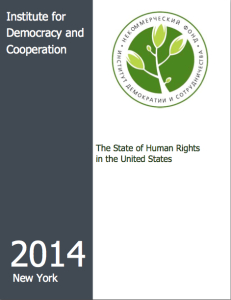Russian News:
I would like to try and add to this blog a weekly Russian news feature. In the beginning this will include my translation of, and brief commentary on, a contemporary Russian news piece. These articles will be chosen fairly at random, and from an array of sources. This first article was released last week on the RIA Novosti website. RIA Novosti is a state-run media outlet in the Russian Federation.
Report: The press in the U.S. is limited in its access to power, and its freedom of speech.
18:52 25 November, 2014 updated- 19:07 25 November, 2014
РИА Новости http://ria.ru/world/20141125/1035102418.html
A report by the Institute for Democracy and Cooperation, made available to RIA Novosti, states that “the reality of contemporary America supports the contention that it is the deliberate policy of the executive branch of the U.S. government to create impediments to the work of reporters.”
Moscow, 25 November 2014—RIA Novosti. Journalists working with government authorities in the U.S. experience problems gaining access to them, and point to restrictions on freedom of speech. This is, moreover, seen as the deliberate policy of America’s executive branch. These are the assertions of a 2014 report on human rights by the Institute for Democracy and Cooperation, made available to RIA Novosti.
The report states: “Problems persist for journalists in the United States today regarding access to government authorities, and respect for freedom of speech. For those who hope that the rich tradition of struggle for the preservation of freedoms of expression will mean that the current difficulties in maintaining these freedoms will be overcome, the problems arising for journalists are of particular concern.”
The document adds: “The reality of contemporary America supports the contention that it is the deliberate policy of the executive branch of the U.S. government to create impediments to the work of reporters, and that there is simply not enough of an influential political force in the country today that could effectively fight to improve the situation.”
So, according to information from the Committee to Protect Journalists, which is cited by the author of the report, the White House limits the release of information, and uses its tools for the dissemination of information to the public to avoid communication with journalists. Specifically, this means that photographers are not permitted at world-leader summits, limiting the release of information about the outcome of events to the media.
It is also noted that officials of the Obama administration don’t want to share even unclassified information, for fear of investigation, and government surveillance interferes with the ability of journalists to protect the confidentiality of their sources. The possibility of insisting on confidential sources in the U.S. came up last year when the Appeals Court for the Fourth District in Virginia decided that during criminal proceedings reporters are deprived of the privilege to preserve the confidentiality of their sources.
As a result, the reports adds, American officials are more and more afraid to talk to the press, “as those who do are then subject to investigation, including lie detector tests and scrutiny of the their email and telephone conversations.”
This interesting little Russian news article by the pro-Kremlin RIA Novosti harkens back to Cold War era tit-for-tat accusations of violations of human rights abuses on both sides. Press in the U.S. continues to report relentlessly on the Putin regime’s stranglehold on media in the Russian republic as evidence of Vlad Vladimirovich’s distinctly anti-democratic exercises of power in Russia. On the other side, this Novosti article latches onto a report by the Institute for Democracy and Cooperation to point to the Obama administration’s efforts to control the flow of information and contain leaks as evidence of restrictions on freedom of speech in the U.S.
Unfortunately Novosti does not include any particulars about this group—not even a link to their website, or to the document quoted. It appears, though, that this article is looking at a report called, “The State of Human Rights in the United States-2014,” specifically the chapter entitled, “Freedom of Speech and the Work of Journalists,” by the New York-based Institute for Democracy and Cooperation (not the Paris-based L’Institut de la Démocratie et de la Coopération, or IDC).
Whereas most of the points highlighted by the Novosti article are discussed in the report, some of the specific quotes are nowhere to be found. In fact, only the last quote—about why American officials are increasingly reluctant to speak to the press—is something that actually appears in the report. This point is taken from another report, also mentioned in the article, by the Committee to Protect Journalists. The other quotes in this article—one of which opens the article, is repeated once, and paraphrased an additional time—do not appear anywhere in the 149 page report.
Both reports—by the Institute for Democracy and Cooperation and the Committee to Protect Journalists—are fair, well researched and worth reading. Interestingly, the chapter on freedom of the press and the work of journalists, in the human rights report, relies almost entirely on the work of journalists.
Perhaps the report “made available to RIA Novosti” is different from the one posted on the website of the Institute for Democracy and Cooperation; or something has been lost, or found, in translation. Regardless, it would be helpful if they could properly cite this source. Unfortunately these oversights take away from what is fair, and important, criticism of U.S. behavior in regards human rights.
© 2014, John Dougherty. All rights reserved
